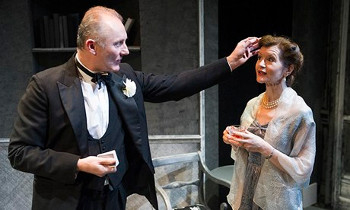The White Carnation

© Tristram Kenton
The Finborough has been making some remarkable rediscoveries lately and, while R C Sherriff’s spooky 1953 Christmas Eve wartime drama may not be all that unfairly forgotten, it’s certainly an unusual and imaginative choice for a seasonal surprise.
After the war, the author of Journey’s End wrote a couple of West End vehicles for Ralph Richardson who had taken to wandering spectrally around the stage in a trance, and a world of his own. So, the Richardson character in The White Carnation, John Greenwood, is a wealthy London stockbroker who discovers another life in books and music after his house is hit by a doodlebug and the other guests, and his wife, wiped out.
The play’s a sort of haunting, combining elements of J B Priestley and J M Barrie, but director Knight Mantell and Aden Gillett as Greenwood make an interesting decision: to render Greenwood the exact opposite of a Richardsonian eccentric, an ill-mannered bore whose habitual rudeness towards his despised aristocratic wife, Lady Mary (Lynette Edwards), is replaced by a sudden affection for a bright young librarian (Daisy Boulton).
The bombed house becomes a target for post-war developers and Greenwood an object of curiosity for a decrepit old doctor (Derek Wright), the neighbourhood vicar (a delightful cameo by a furrow-browed, ever assuaging Benjamin Whitrow) and a man from the Home Office (Philip York) who consigns to him the identity of a non-natural ectoplasm.
There’s also a nosy neighbour (Josie Kidd) who goes on forever – too long, anyway – about her holidays in Bournemouth and reveals a defining moment in the marriage as when Greenwood forgot all about a theatre outing and Lady Mary went quietly to bed without mentioning her disappointment.
It’s hard sometimes to deduce what Gillett’s physically imposing and emotionally vulnerable Greenwood is exactly thinking, or going through, while the play splinters around him into what Kenneth Tynan called a confusion of moods, with a touch of Ealing comedy. His diction is curiously imprecise, too, as though wishing at all points to replace any hint of the supernatural with an everyday phrase or verbal shrug.
But there’s a strong sense of social adjustment going on and, while the throat-catching final scene doesn’t have the magical strangeness you might hope for, it does make a powerful point about living your life twice and learning a lesson; and it’s a rare pleasure to see a dozen actors crammed on a tiny stage in period costume for two hours with lines mostly well worth saying.










